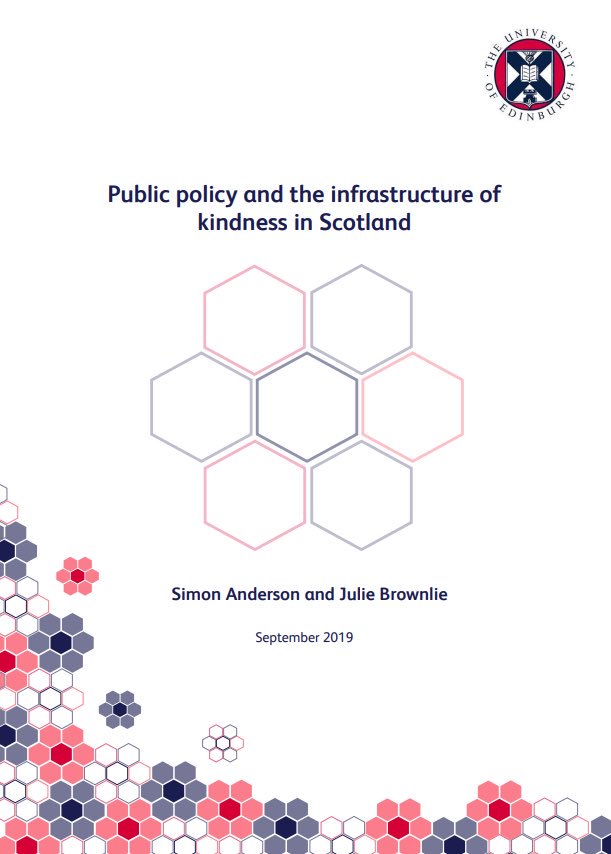How can public policy support an ‘infrastructure of kindness’ in Scotland?
Posted on 24 Oct 2019 Categories: Good Society, News, Reports, The society we want, The state we want, Wellbeing

A new report from Carnegie UK, Public policy and the infrastructure of kindness in Scotland, explores the decision to put kindness at the centre of the Scottish National Performance Framework (NPF) and asks ‘what would it mean to take seriously [this] commitment to kindness?’
The report calls for a robust definition of the term ‘kindness’, not only ‘to understand what the value commitment at the heart of the NPF might actually look like in practice’, but also to mitigate the risk that kindness is just seen as ‘impossible to disagree with but lacking in substance’, or an attempt to ‘manipulate communities and individuals into taking on roles and tasks that should really be the responsibility of the state or other collective actors’. The report puts forward its definition:
‘kindness involves small-scale and sometimes barely visible practices of recognition, help and support, in which individuals – even if they are acting within organisational contexts – respond to the needs of others in ways that are essentially unobligated, often emotionally complex and always deeply social’.
It also introduces the term ‘the infrastructure of kindness’, which is to make clear that these ‘small acts of everyday kindness are fundamental: they make possible other things’, such as helping a parent to stay in employment or helping an ‘older person with disabilities to remain in the community’.
The report seeks to explore three questions: understanding how people become aware of the needs of others; what then leads them to feel able to offer help, or stops them from doing so; and, finally, what enables people to feel able to seek or accept help, or again, what might stop them doing so. It acknowledges that these acts of kindness ‘can only flourish in the right conditions and that key structural factors, such as poverty, racism or poor housing, are inimical to such conditions’. It argues that public policy also needs to ‘attend to the more immediate preconditions for the infrastructure of kindness’, and recommends ways in which to do so.
First, the report points out that an infrastructure of kindness is ‘dependent on social infrastructures of various kinds’, such as public spaces, libraries and cafes, which provide opportunities for people to connect, ‘become aware of the needs of others, and feel able to ask for, offer or accept help’. Creating and preserving these spaces should be enshrined in public policy. The report also recommends examining the relationships within organisations, such as those between staff and employees, or staff and service users. Allowing for more informal interactions between staff, and encouraging ‘the pursuit of greater relational discretion within professional roles’ could make for ‘kind(er) organisations’. Finally, governments and other organisations can use ‘narratives of kindness’ to help people feel able to offer and receive kindness. The report makes clear that these narratives need to be consistent with people’s actual experience of the organisation; ‘organisations need to both talk the talk and walk the walk’.
The report concludes:
‘Acts of kindness are those moments in our everyday lives when we choose – in small-scale and fleeting ways – to draw our boundaries a little wider. In the context of global and more local developments that threaten to do the opposite, to reinforce the lines between “them” and “us”, such moments – and the encouragement and support of them through public policy and other forms of collective action – are part of an increasingly necessary and radical endeavour.’
Read the full report here.
Posted on 24 Oct 2019 Categories: Good Society, News, Reports, The society we want, The state we want, Wellbeing
